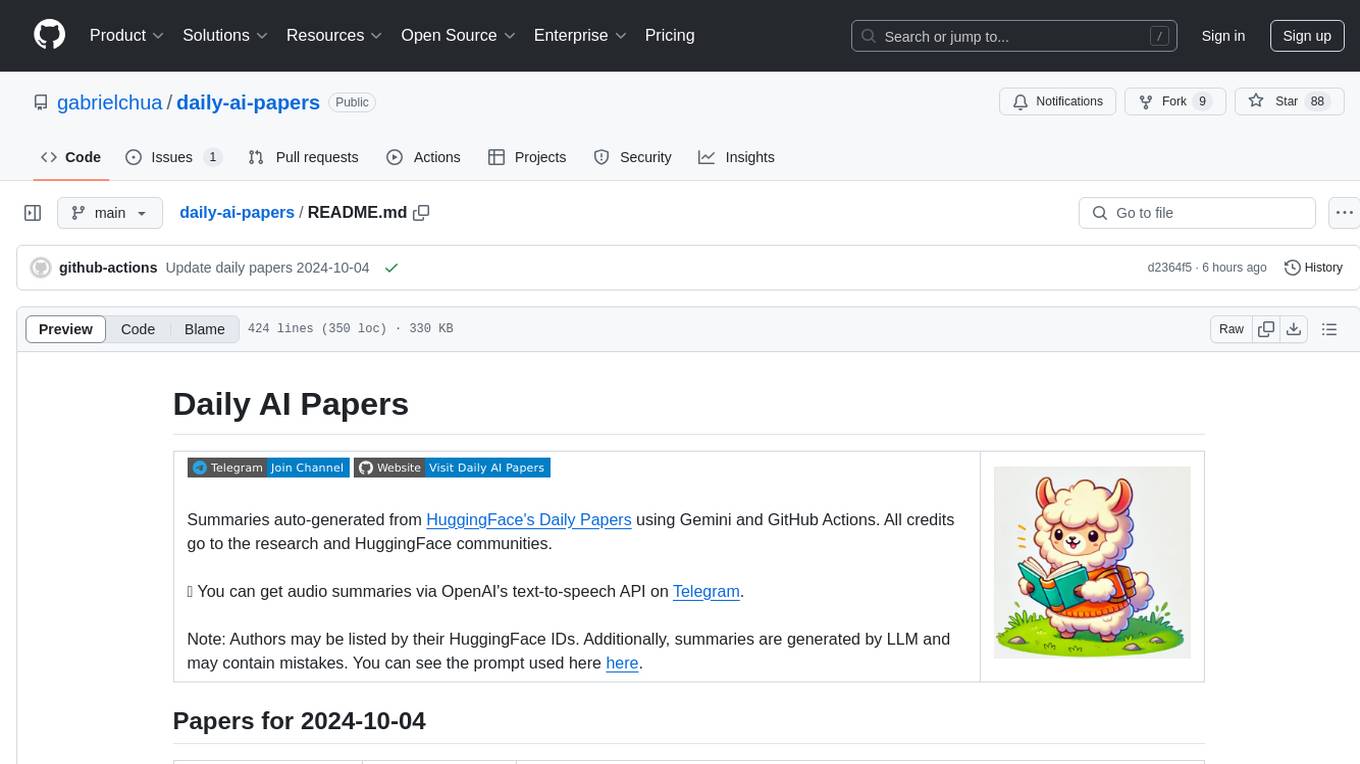
LLM-Fine-Tuning
None
Stars: 120
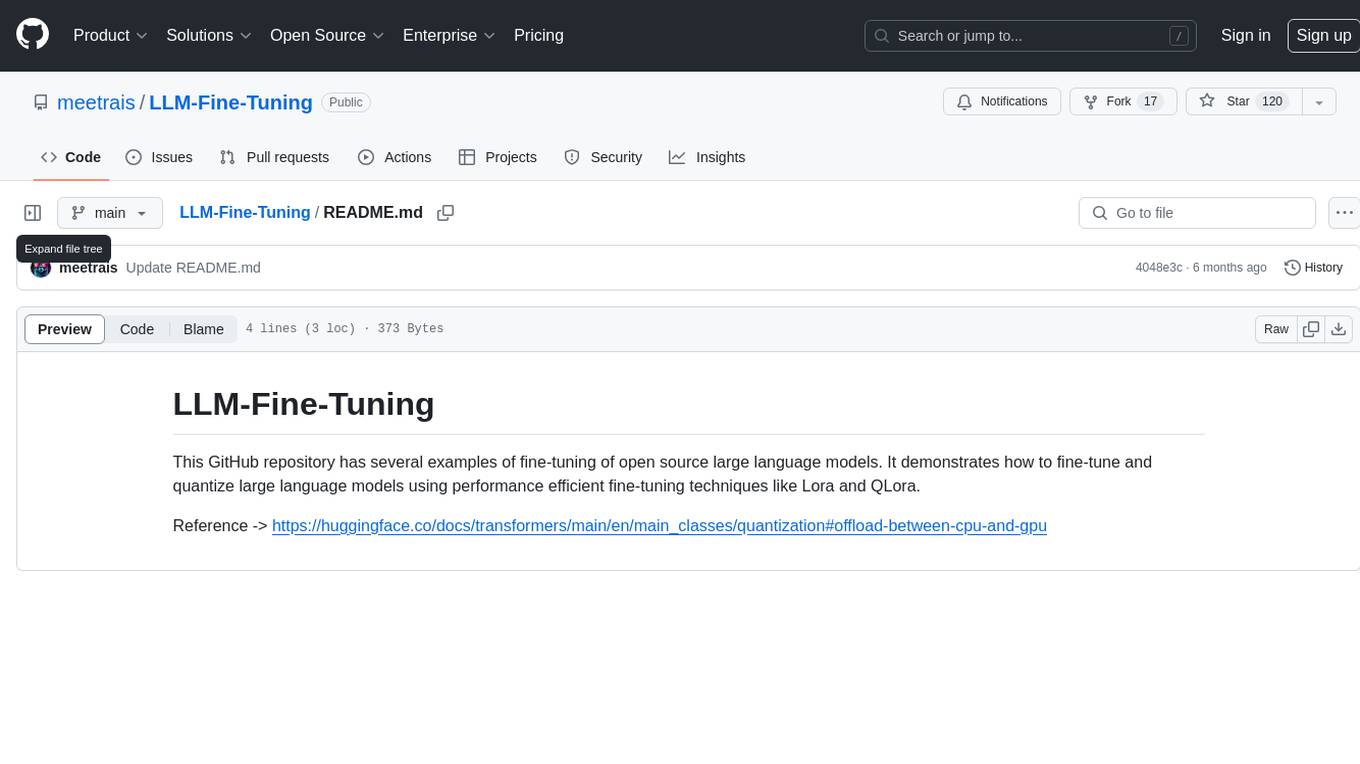
This GitHub repository contains examples of fine-tuning open source large language models. It showcases the process of fine-tuning and quantizing large language models using efficient techniques like Lora and QLora. The repository serves as a practical guide for individuals looking to optimize the performance of language models through fine-tuning.
README:
This GitHub repository has several examples of fine-tuning of open source large language models. It demonstrates how to fine-tune and quantize large language models using performance efficient fine-tuning techniques like Lora and QLora.
Reference -> https://huggingface.co/docs/transformers/main/en/main_classes/quantization#offload-between-cpu-and-gpu
For Tasks:
Click tags to check more tools for each tasksFor Jobs:
Alternative AI tools for LLM-Fine-Tuning
Similar Open Source Tools

LLM-Fine-Tuning
This GitHub repository contains examples of fine-tuning open source large language models. It showcases the process of fine-tuning and quantizing large language models using efficient techniques like Lora and QLora. The repository serves as a practical guide for individuals looking to optimize the performance of language models through fine-tuning.
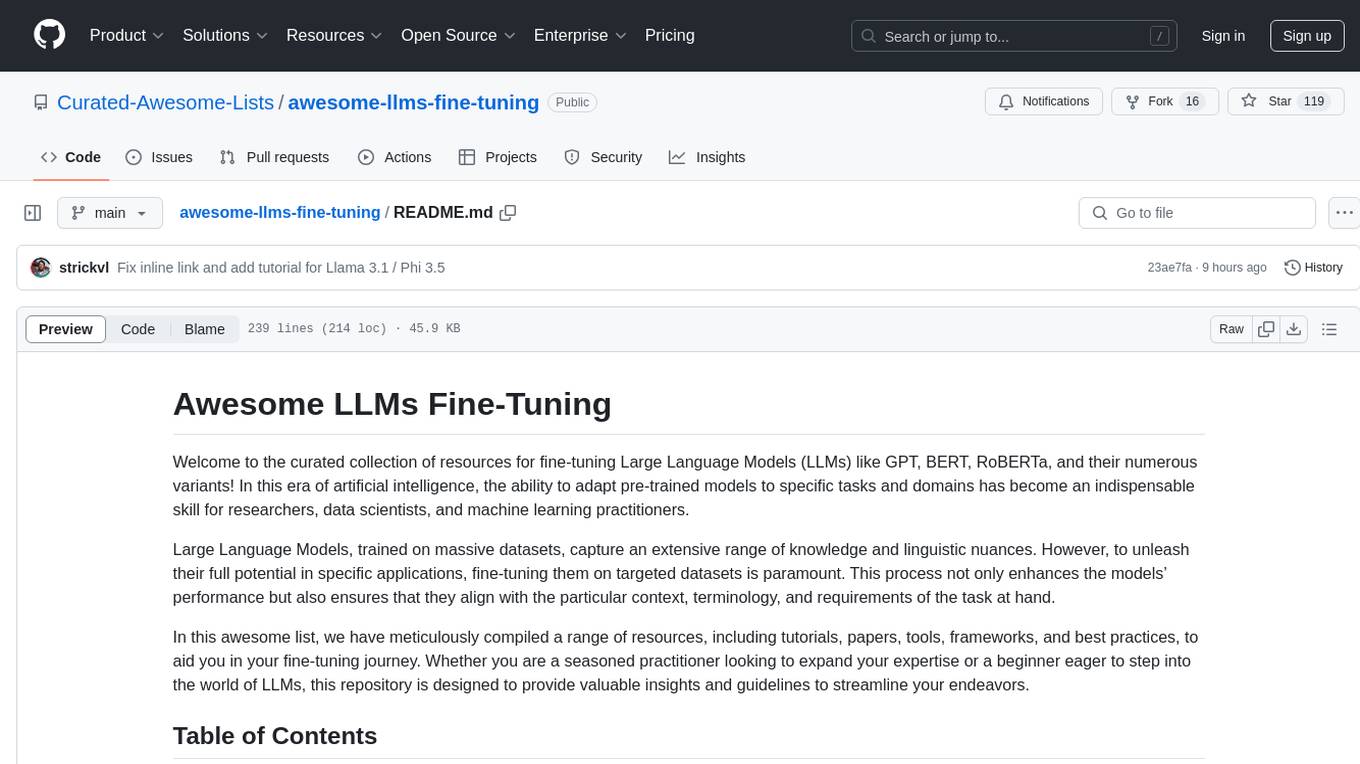
awesome-llms-fine-tuning
This repository is a curated collection of resources for fine-tuning Large Language Models (LLMs) like GPT, BERT, RoBERTa, and their variants. It includes tutorials, papers, tools, frameworks, and best practices to aid researchers, data scientists, and machine learning practitioners in adapting pre-trained models to specific tasks and domains. The resources cover a wide range of topics related to fine-tuning LLMs, providing valuable insights and guidelines to streamline the process and enhance model performance.
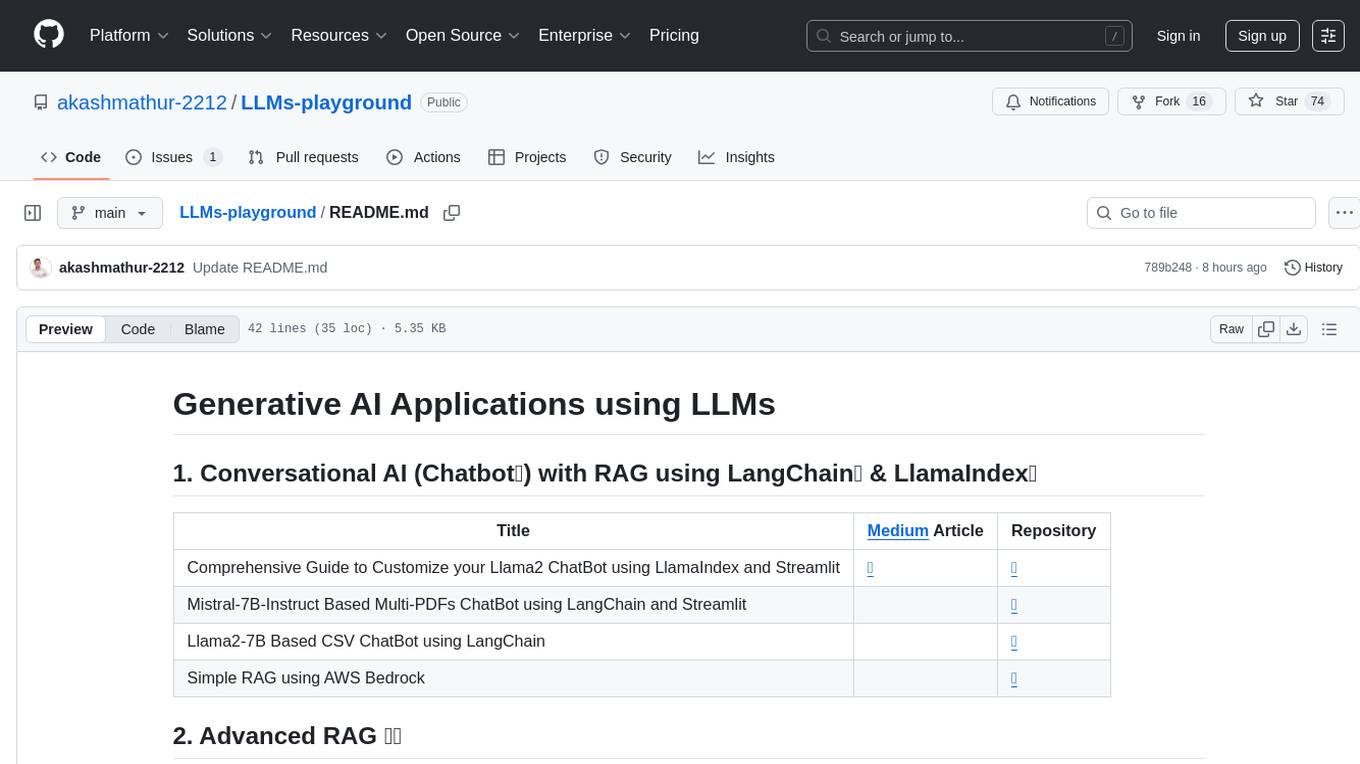
LLMs-playground
LLMs-playground is a repository containing code examples and tutorials for learning and experimenting with Large Language Models (LLMs). It provides a hands-on approach to understanding how LLMs work and how to fine-tune them for specific tasks. The repository covers various LLM architectures, pre-training techniques, and fine-tuning strategies, making it a valuable resource for researchers, students, and practitioners interested in natural language processing and machine learning. By exploring the code and following the tutorials, users can gain practical insights into working with LLMs and apply their knowledge to real-world projects.
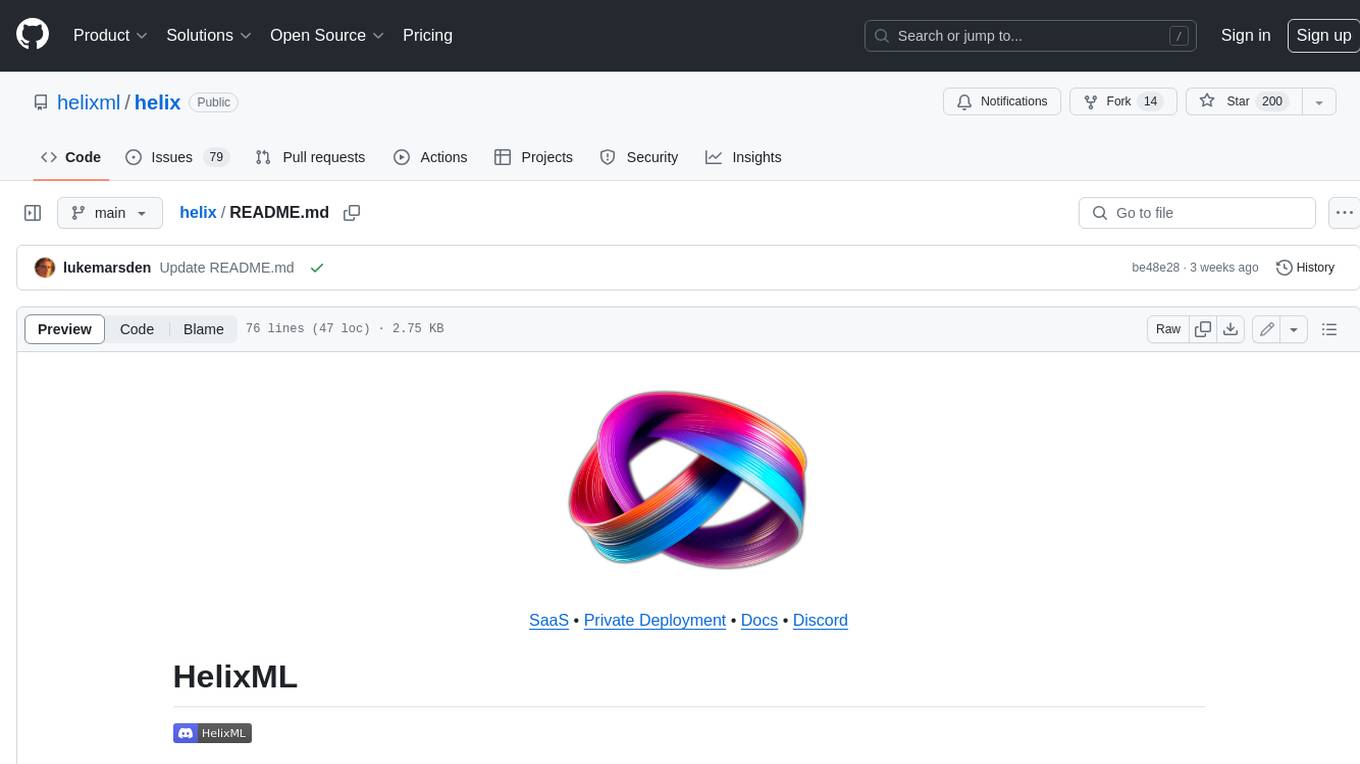
helix
HelixML is a private GenAI platform that allows users to deploy the best of open AI in their own data center or VPC while retaining complete data security and control. It includes support for fine-tuning models with drag-and-drop functionality. HelixML brings the best of open source AI to businesses in an ergonomic and scalable way, optimizing the tradeoff between GPU memory and latency.
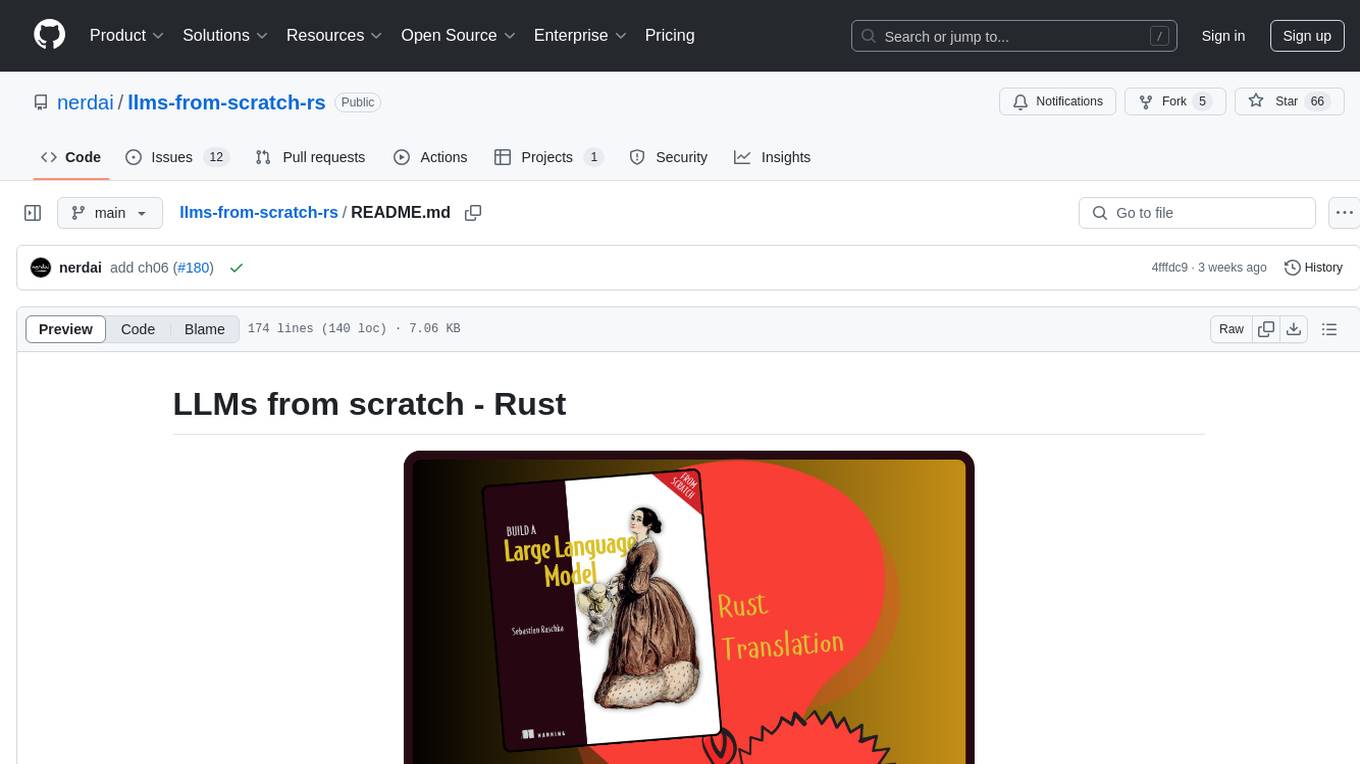
llms-from-scratch-rs
This project provides Rust code that follows the text 'Build An LLM From Scratch' by Sebastian Raschka. It translates PyTorch code into Rust using the Candle crate, aiming to build a GPT-style LLM. Users can clone the repo, run examples/exercises, and access the same datasets as in the book. The project includes chapters on understanding large language models, working with text data, coding attention mechanisms, implementing a GPT model, pretraining unlabeled data, fine-tuning for classification, and fine-tuning to follow instructions.

llms-tools
The 'llms-tools' repository is a comprehensive collection of AI tools, open-source projects, and research related to Large Language Models (LLMs) and Chatbots. It covers a wide range of topics such as AI in various domains, open-source models, chats & assistants, visual language models, evaluation tools, libraries, devices, income models, text-to-image, computer vision, audio & speech, code & math, games, robotics, typography, bio & med, military, climate, finance, and presentation. The repository provides valuable resources for researchers, developers, and enthusiasts interested in exploring the capabilities of LLMs and related technologies.
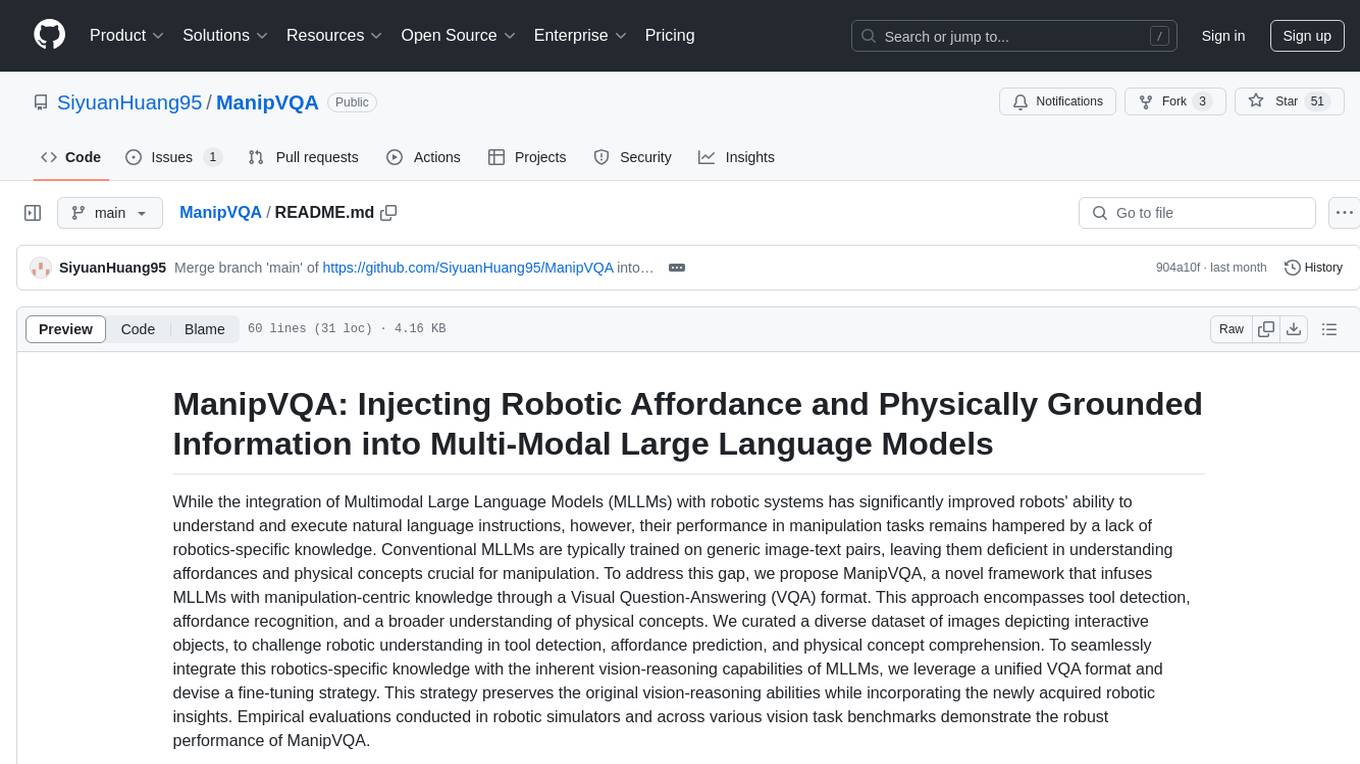
ManipVQA
ManipVQA is a framework that enhances Multimodal Large Language Models (MLLMs) with manipulation-centric knowledge through a Visual Question-Answering (VQA) format. It addresses the deficiency of conventional MLLMs in understanding affordances and physical concepts crucial for manipulation tasks. By infusing robotics-specific knowledge, including tool detection, affordance recognition, and physical concept comprehension, ManipVQA improves the performance of robots in manipulation tasks. The framework involves fine-tuning MLLMs with a curated dataset of interactive objects, enabling robots to understand and execute natural language instructions more effectively.

nlp-llms-resources
The 'nlp-llms-resources' repository is a comprehensive resource list for Natural Language Processing (NLP) and Large Language Models (LLMs). It covers a wide range of topics including traditional NLP datasets, data acquisition, libraries for NLP, neural networks, sentiment analysis, optical character recognition, information extraction, semantics, topic modeling, multilingual NLP, domain-specific LLMs, vector databases, ethics, costing, books, courses, surveys, aggregators, newsletters, papers, conferences, and societies. The repository provides valuable information and resources for individuals interested in NLP and LLMs.
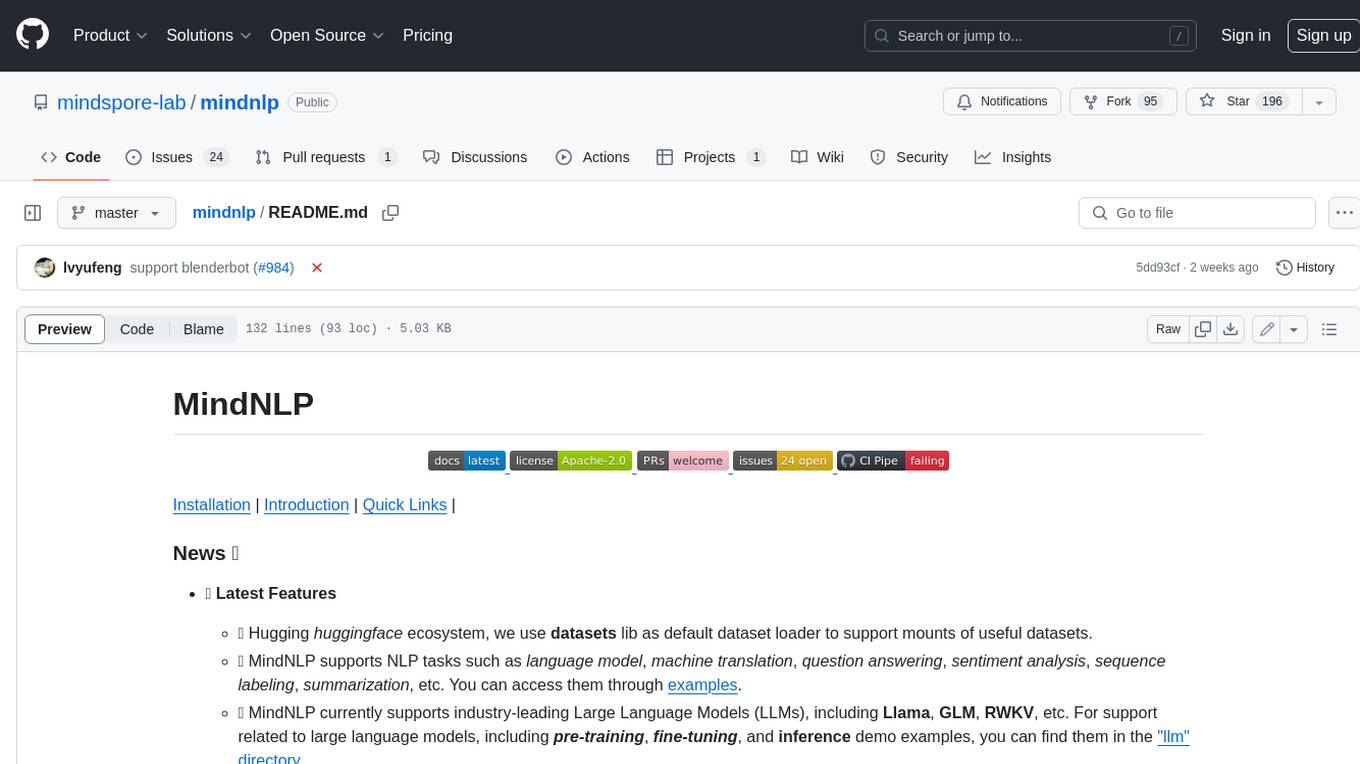
mindnlp
MindNLP is an open-source NLP library based on MindSpore. It provides a platform for solving natural language processing tasks, containing many common approaches in NLP. It can help researchers and developers to construct and train models more conveniently and rapidly. Key features of MindNLP include: * Comprehensive data processing: Several classical NLP datasets are packaged into a friendly module for easy use, such as Multi30k, SQuAD, CoNLL, etc. * Friendly NLP model toolset: MindNLP provides various configurable components. It is friendly to customize models using MindNLP. * Easy-to-use engine: MindNLP simplified complicated training process in MindSpore. It supports Trainer and Evaluator interfaces to train and evaluate models easily. MindNLP supports a wide range of NLP tasks, including: * Language modeling * Machine translation * Question answering * Sentiment analysis * Sequence labeling * Summarization MindNLP also supports industry-leading Large Language Models (LLMs), including Llama, GLM, RWKV, etc. For support related to large language models, including pre-training, fine-tuning, and inference demo examples, you can find them in the "llm" directory. To install MindNLP, you can either install it from Pypi, download the daily build wheel, or install it from source. The installation instructions are provided in the documentation. MindNLP is released under the Apache 2.0 license. If you find this project useful in your research, please consider citing the following paper: @misc{mindnlp2022, title={{MindNLP}: a MindSpore NLP library}, author={MindNLP Contributors}, howpublished = {\url{https://github.com/mindlab-ai/mindnlp}}, year={2022} }

awesome-generative-ai-guide
This repository serves as a comprehensive hub for updates on generative AI research, interview materials, notebooks, and more. It includes monthly best GenAI papers list, interview resources, free courses, and code repositories/notebooks for developing generative AI applications. The repository is regularly updated with the latest additions to keep users informed and engaged in the field of generative AI.

oreilly-hands-on-gpt-llm
This repository contains code for the O'Reilly Live Online Training for Deploying GPT & LLMs. Learn how to use GPT-4, ChatGPT, OpenAI embeddings, and other large language models to build applications for experimenting and production. Gain practical experience in building applications like text generation, summarization, question answering, and more. Explore alternative generative models such as Cohere and GPT-J. Understand prompt engineering, context stuffing, and few-shot learning to maximize the potential of GPT-like models. Focus on deploying models in production with best practices and debugging techniques. By the end of the training, you will have the skills to start building applications with GPT and other large language models.
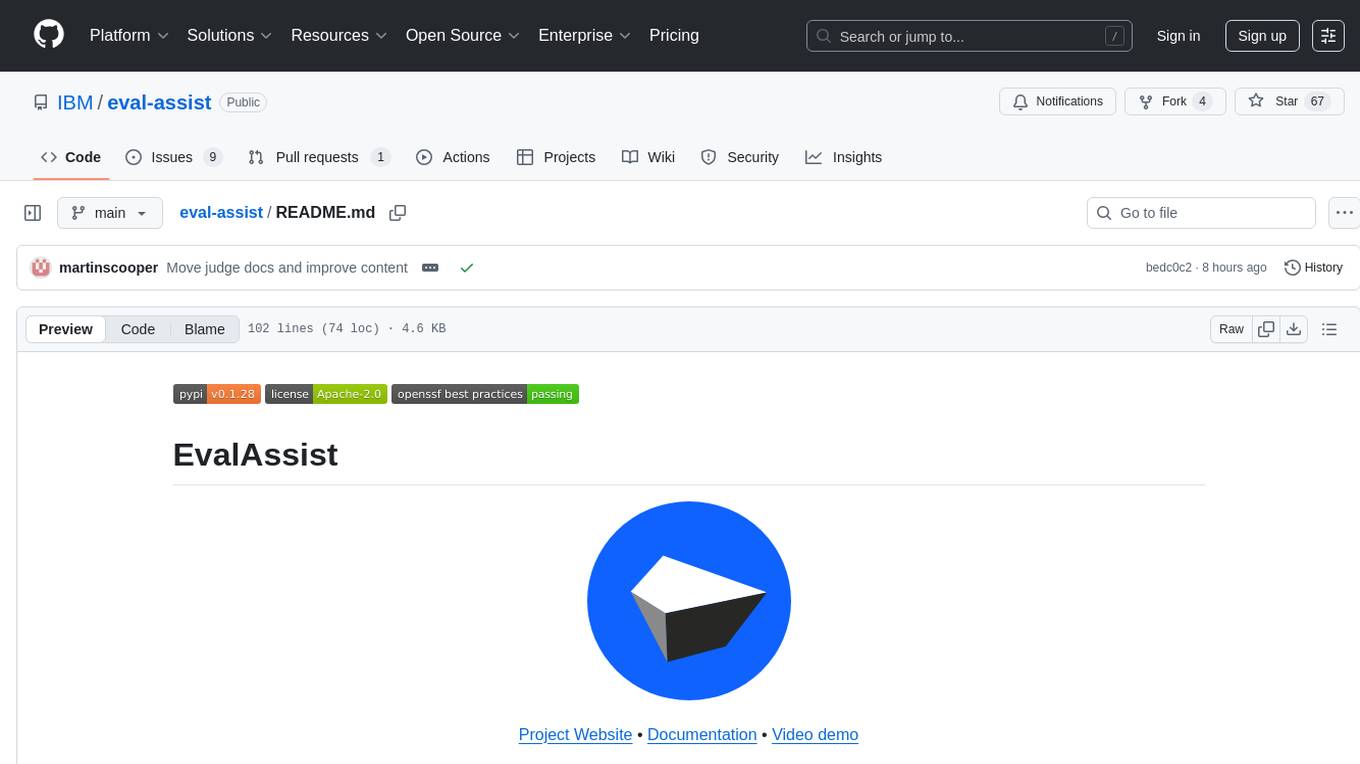
eval-assist
EvalAssist is an LLM-as-a-Judge framework built on top of the Unitxt open source evaluation library for large language models. It provides users with a convenient way of iteratively testing and refining LLM-as-a-judge criteria, supporting both direct (rubric-based) and pairwise assessment paradigms. EvalAssist is model-agnostic, supporting a rich set of off-the-shelf judge models that can be extended. Users can auto-generate a Notebook with Unitxt code to run bulk evaluations and save their own test cases. The tool is designed for evaluating text data using language models.
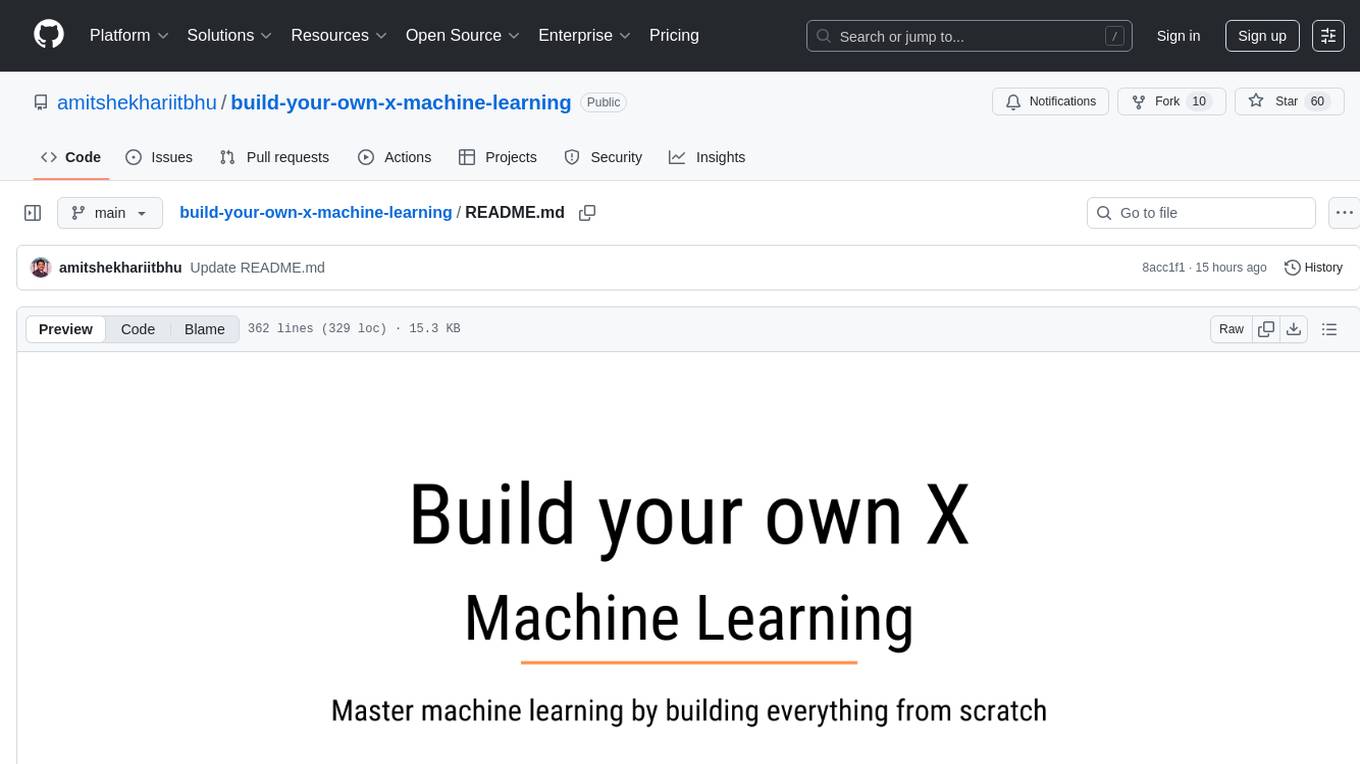
build-your-own-x-machine-learning
This repository provides a step-by-step guide for building your own machine learning models from scratch. It covers various machine learning algorithms and techniques, including linear regression, logistic regression, decision trees, and neural networks. The code examples are written in Python and include detailed explanations to help beginners understand the concepts behind machine learning. By following the tutorials in this repository, you can gain a deeper understanding of how machine learning works and develop your own models for different applications.
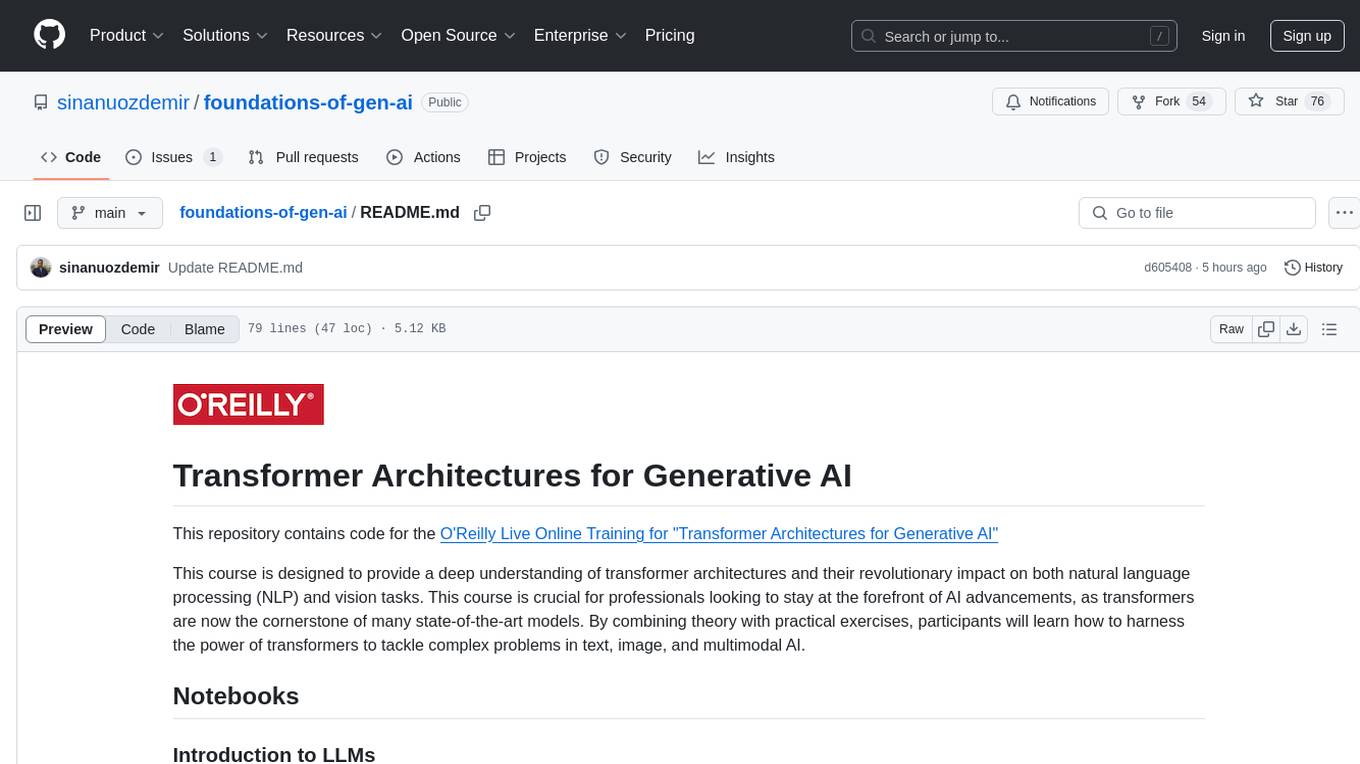
foundations-of-gen-ai
This repository contains code for the O'Reilly Live Online Training for 'Transformer Architectures for Generative AI'. The course provides a deep understanding of transformer architectures and their impact on natural language processing (NLP) and vision tasks. Participants learn to harness transformers to tackle problems in text, image, and multimodal AI through theory and practical exercises.
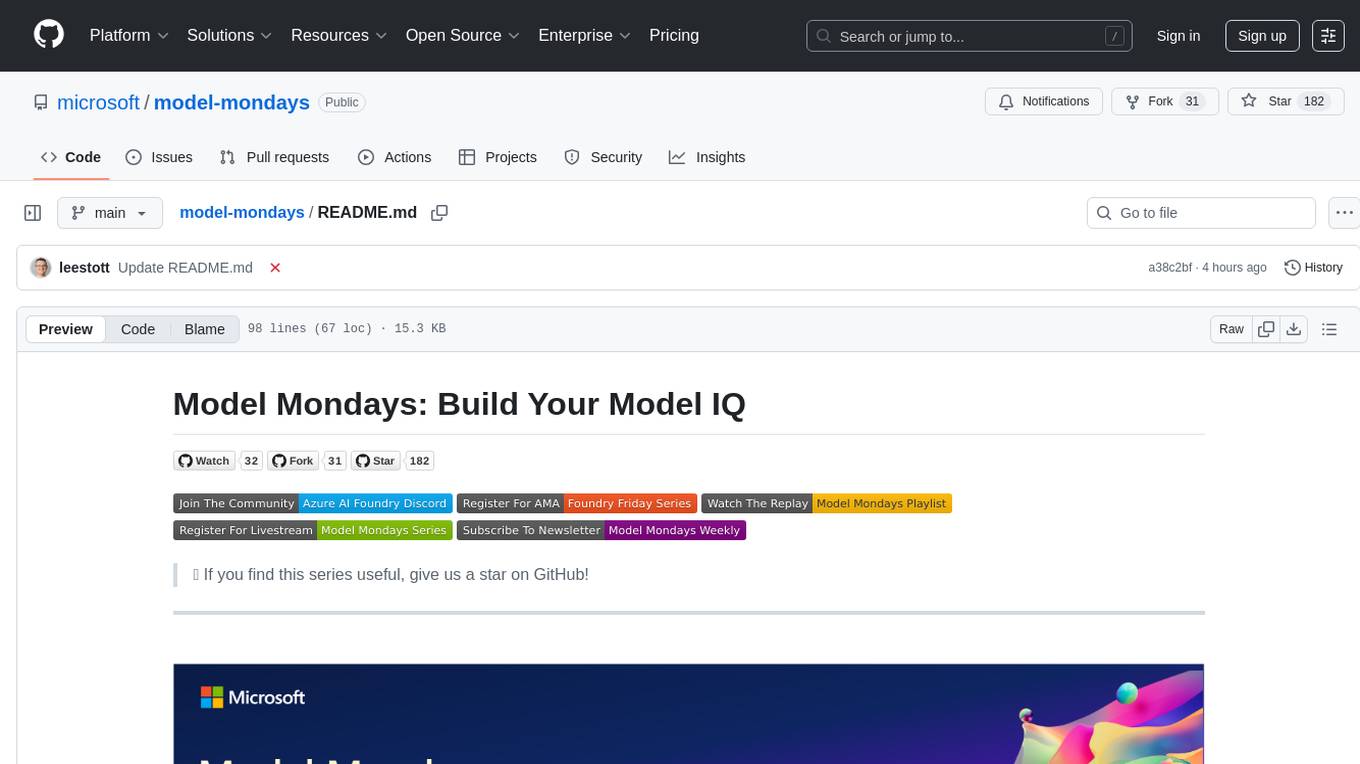
model-mondays
Model Mondays is a repository dedicated to providing a collection of machine learning models implemented in Python. It aims to serve as a resource for individuals looking to explore and experiment with various machine learning algorithms and techniques. The repository includes a wide range of models, from simple linear regression to complex deep learning architectures, along with detailed documentation and examples to facilitate learning and understanding. Whether you are a beginner looking to get started with machine learning or an experienced practitioner seeking reference implementations, Model Mondays offers a valuable repository of models to study and leverage in your projects.
For similar tasks

LLM-Fine-Tuning
This GitHub repository contains examples of fine-tuning open source large language models. It showcases the process of fine-tuning and quantizing large language models using efficient techniques like Lora and QLora. The repository serves as a practical guide for individuals looking to optimize the performance of language models through fine-tuning.
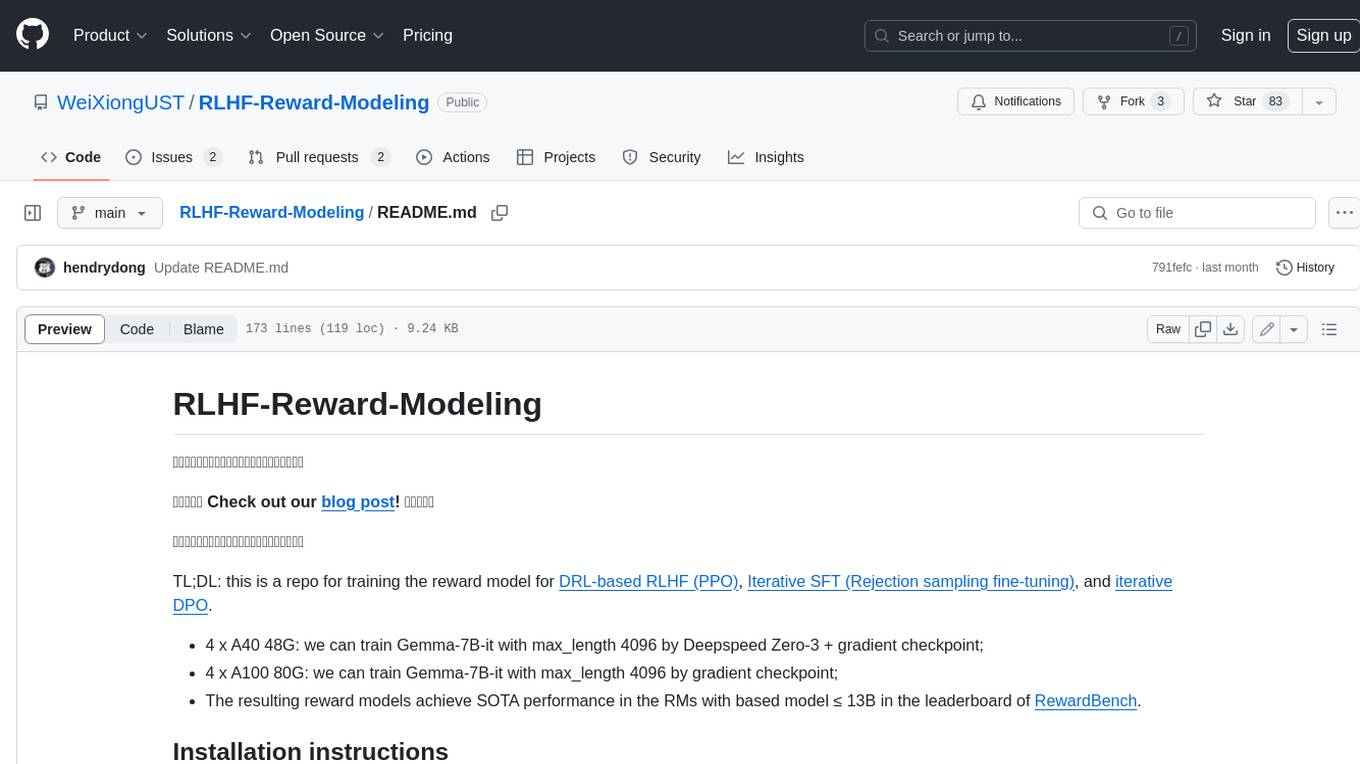
RLHF-Reward-Modeling
This repository contains code for training reward models for Deep Reinforcement Learning-based Reward-modulated Hierarchical Fine-tuning (DRL-based RLHF), Iterative Selection Fine-tuning (Rejection sampling fine-tuning), and iterative Decision Policy Optimization (DPO). The reward models are trained using a Bradley-Terry model based on the Gemma and Mistral language models. The resulting reward models achieve state-of-the-art performance on the RewardBench leaderboard for reward models with base models of up to 13B parameters.
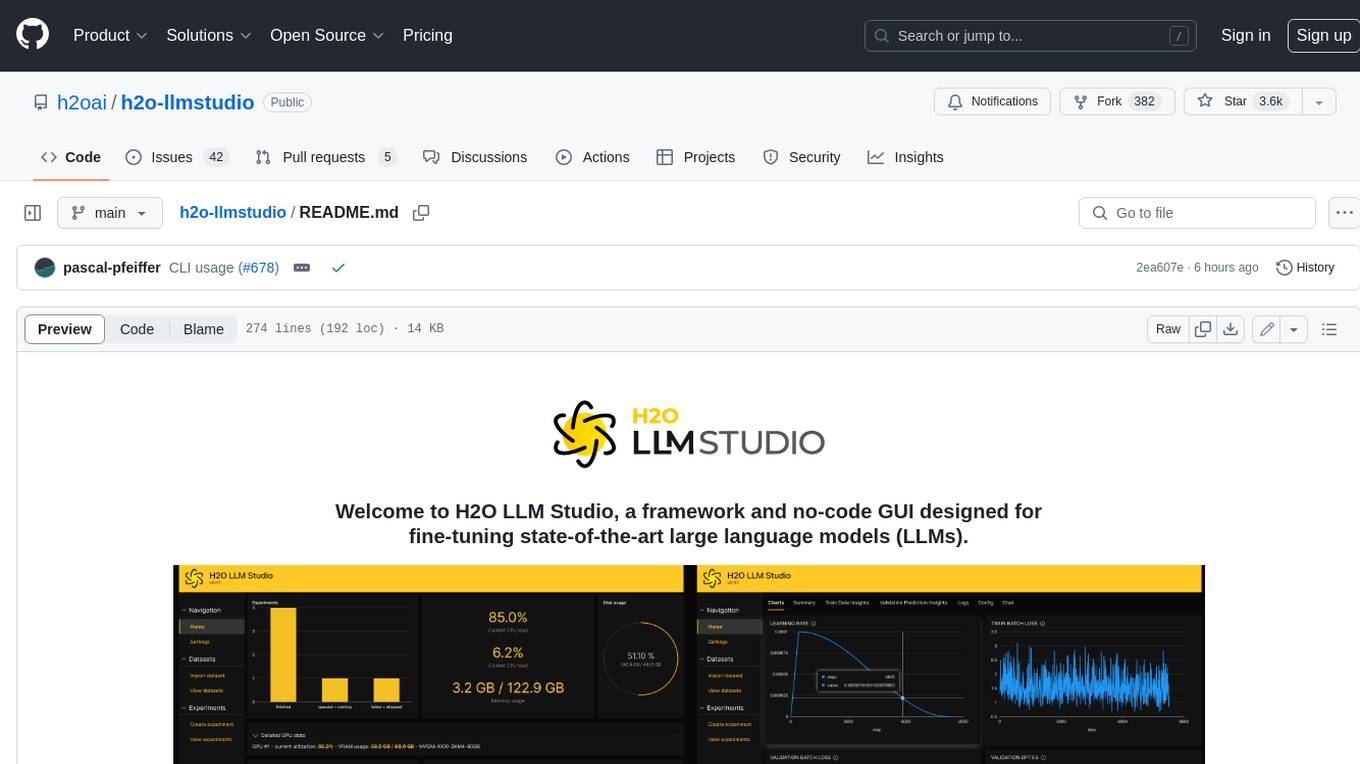
h2o-llmstudio
H2O LLM Studio is a framework and no-code GUI designed for fine-tuning state-of-the-art large language models (LLMs). With H2O LLM Studio, you can easily and effectively fine-tune LLMs without the need for any coding experience. The GUI is specially designed for large language models, and you can finetune any LLM using a large variety of hyperparameters. You can also use recent finetuning techniques such as Low-Rank Adaptation (LoRA) and 8-bit model training with a low memory footprint. Additionally, you can use Reinforcement Learning (RL) to finetune your model (experimental), use advanced evaluation metrics to judge generated answers by the model, track and compare your model performance visually, and easily export your model to the Hugging Face Hub and share it with the community.
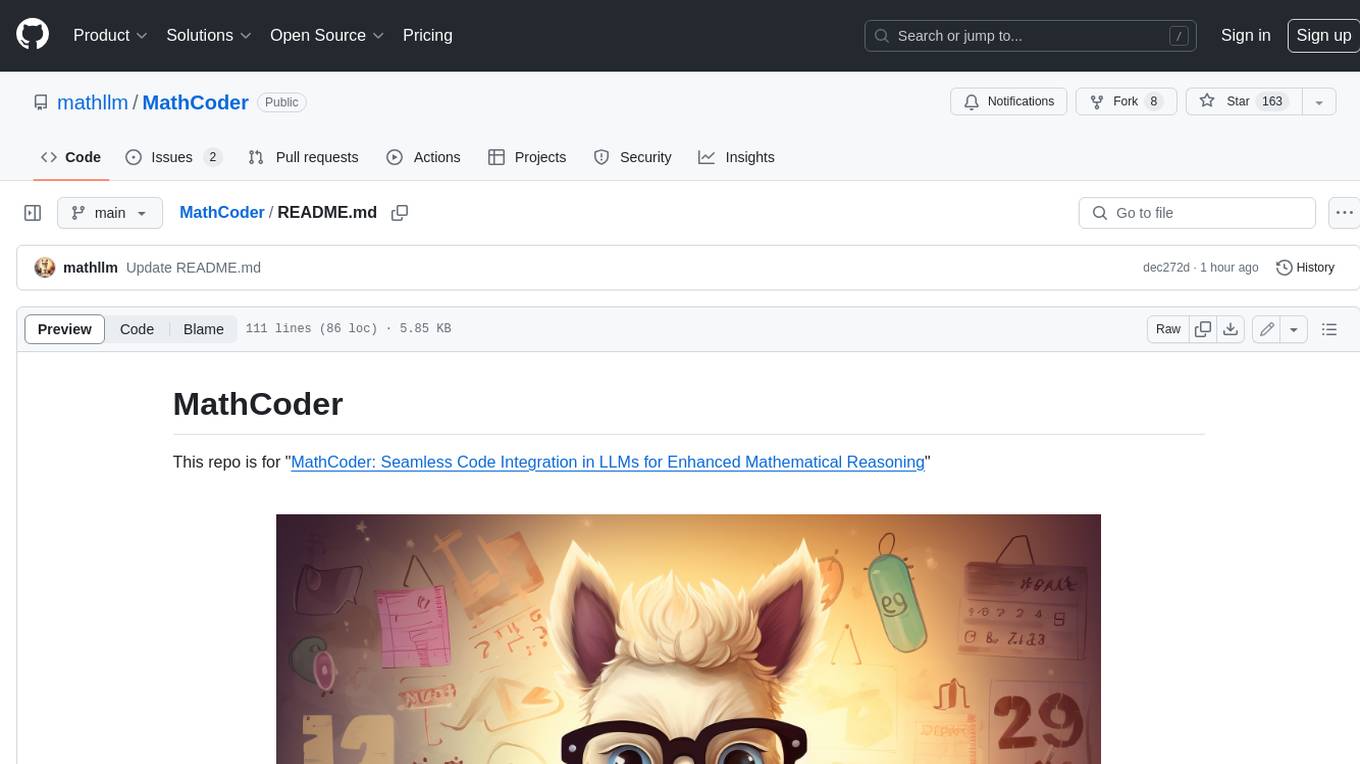
MathCoder
MathCoder is a repository focused on enhancing mathematical reasoning by fine-tuning open-source language models to use code for modeling and deriving math equations. It introduces MathCodeInstruct dataset with solutions interleaving natural language, code, and execution results. The repository provides MathCoder models capable of generating code-based solutions for challenging math problems, achieving state-of-the-art scores on MATH and GSM8K datasets. It offers tools for model deployment, inference, and evaluation, along with a citation for referencing the work.
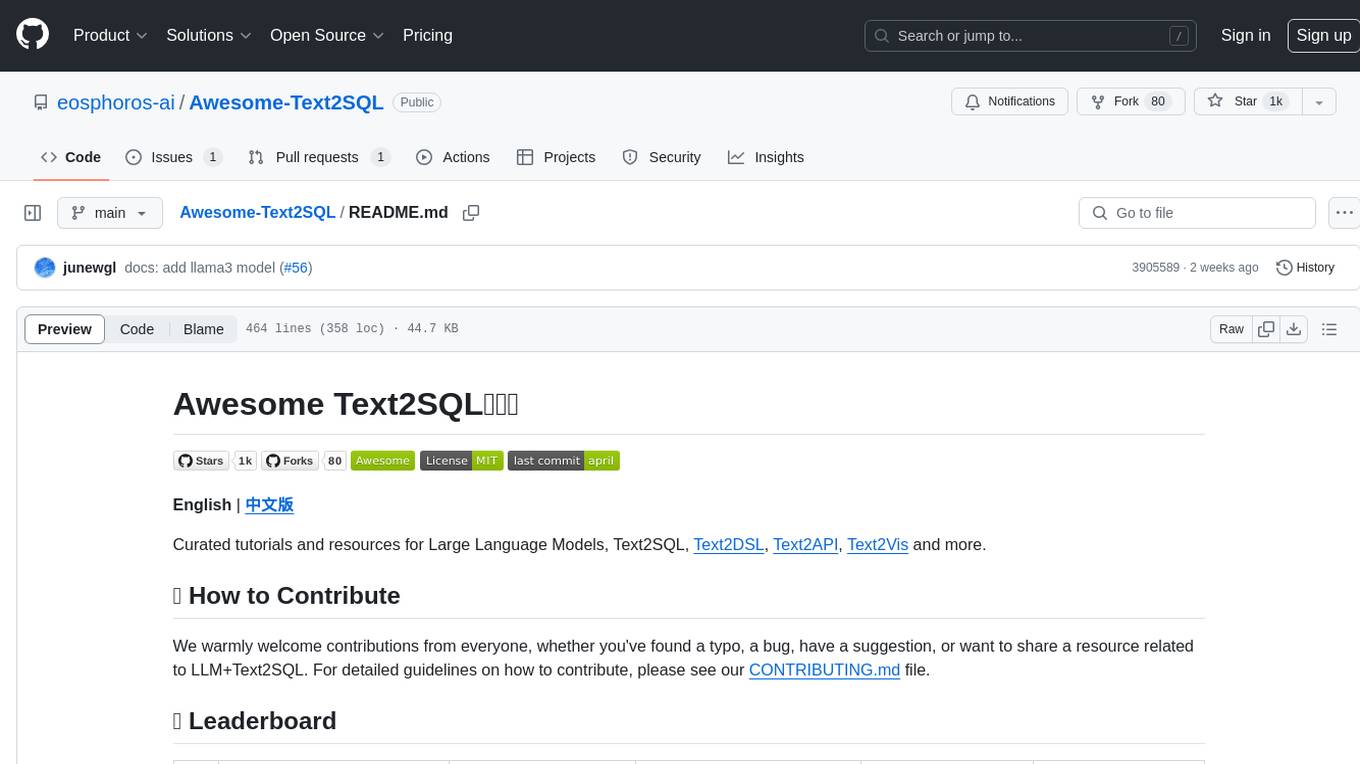
Awesome-Text2SQL
Awesome Text2SQL is a curated repository containing tutorials and resources for Large Language Models, Text2SQL, Text2DSL, Text2API, Text2Vis, and more. It provides guidelines on converting natural language questions into structured SQL queries, with a focus on NL2SQL. The repository includes information on various models, datasets, evaluation metrics, fine-tuning methods, libraries, and practice projects related to Text2SQL. It serves as a comprehensive resource for individuals interested in working with Text2SQL and related technologies.
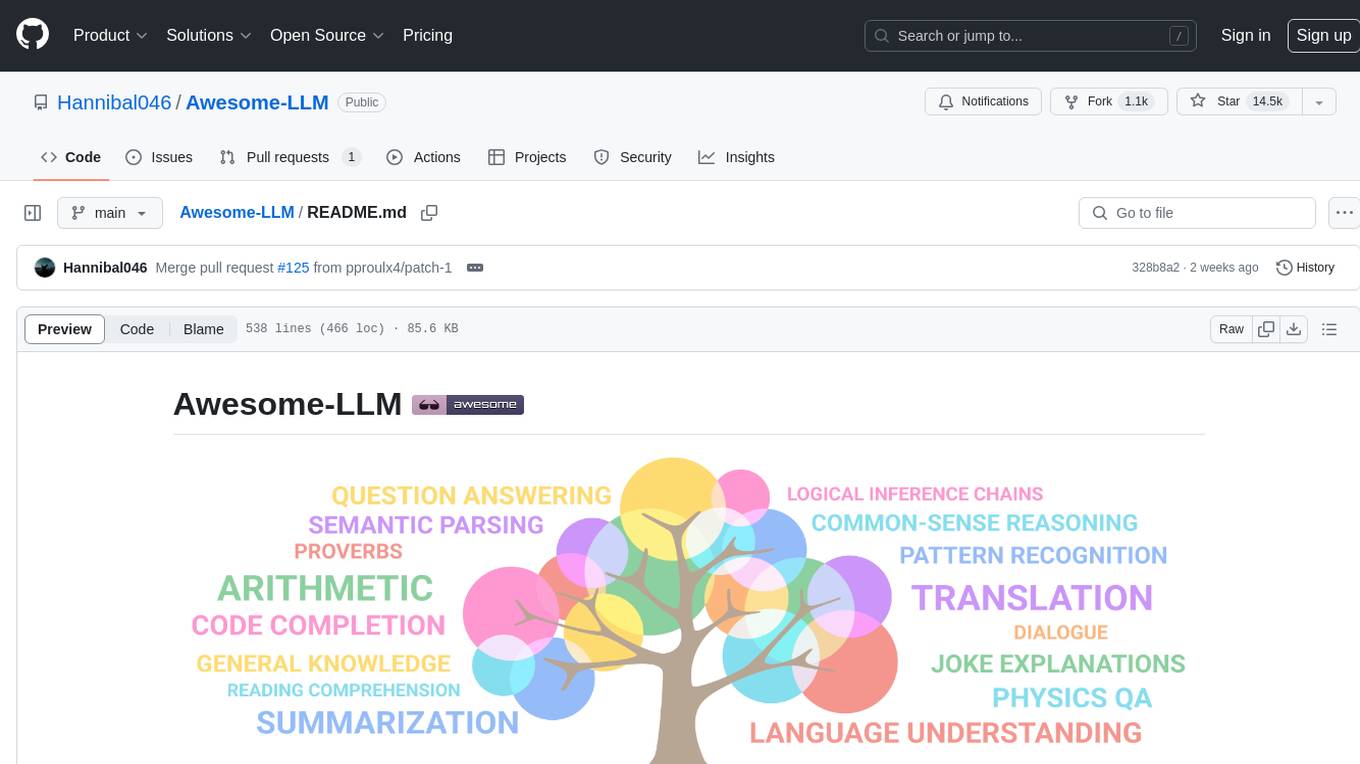
Awesome-LLM
Awesome-LLM is a curated list of resources related to large language models, focusing on papers, projects, frameworks, tools, tutorials, courses, opinions, and other useful resources in the field. It covers trending LLM projects, milestone papers, other papers, open LLM projects, LLM training frameworks, LLM evaluation frameworks, tools for deploying LLM, prompting libraries & tools, tutorials, courses, books, and opinions. The repository provides a comprehensive overview of the latest advancements and resources in the field of large language models.
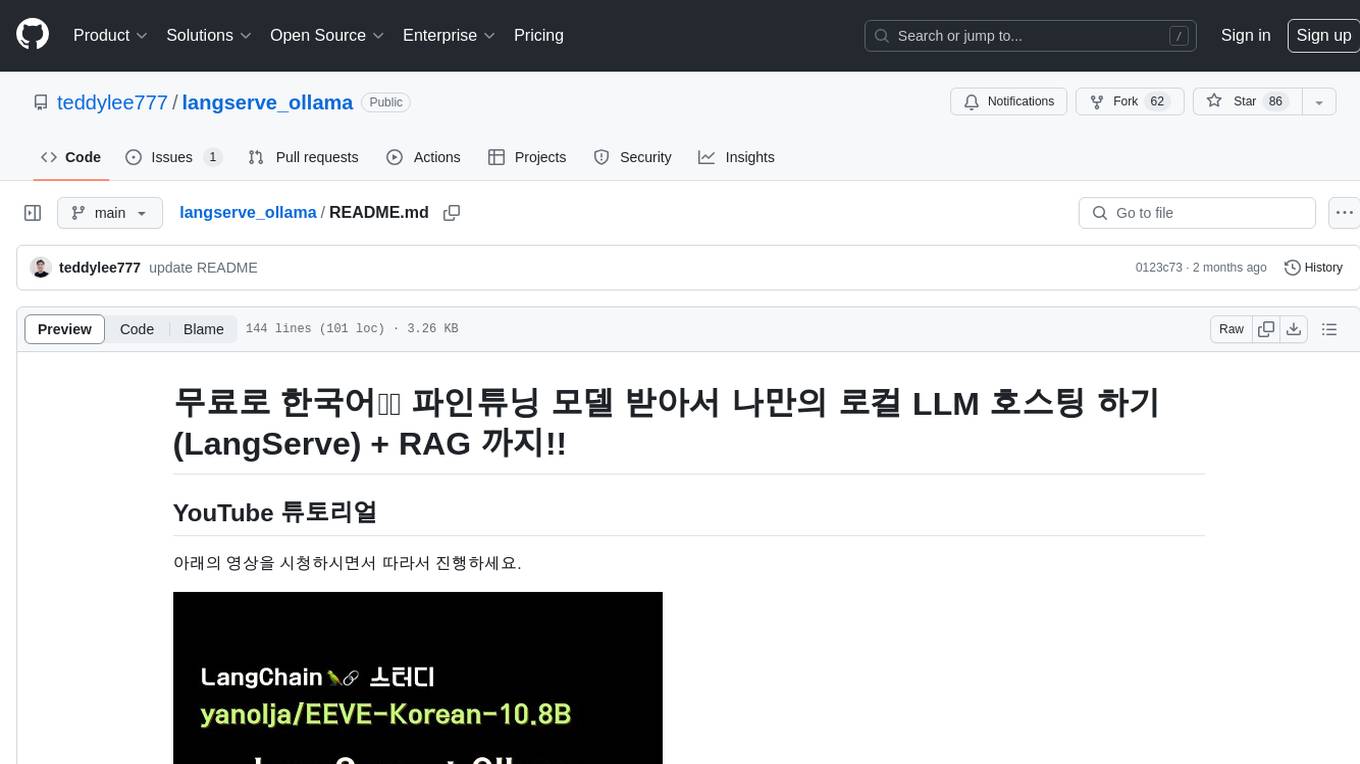
langserve_ollama
LangServe Ollama is a tool that allows users to fine-tune Korean language models for local hosting, including RAG. Users can load HuggingFace gguf files, create model chains, and monitor GPU usage. The tool provides a seamless workflow for customizing and deploying language models in a local environment.
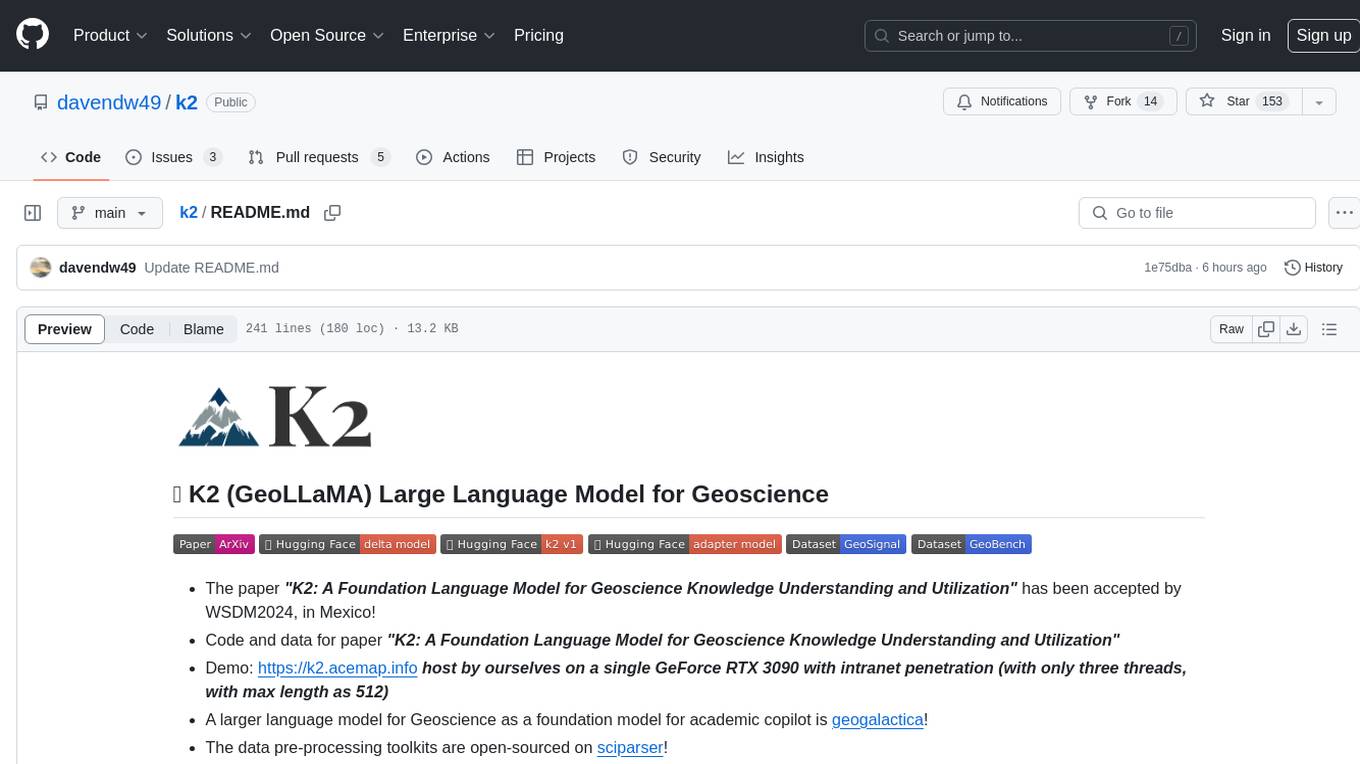
k2
K2 (GeoLLaMA) is a large language model for geoscience, trained on geoscience literature and fine-tuned with knowledge-intensive instruction data. It outperforms baseline models on objective and subjective tasks. The repository provides K2 weights, core data of GeoSignal, GeoBench benchmark, and code for further pretraining and instruction tuning. The model is available on Hugging Face for use. The project aims to create larger and more powerful geoscience language models in the future.
For similar jobs

promptflow
**Prompt flow** is a suite of development tools designed to streamline the end-to-end development cycle of LLM-based AI applications, from ideation, prototyping, testing, evaluation to production deployment and monitoring. It makes prompt engineering much easier and enables you to build LLM apps with production quality.

deepeval
DeepEval is a simple-to-use, open-source LLM evaluation framework specialized for unit testing LLM outputs. It incorporates various metrics such as G-Eval, hallucination, answer relevancy, RAGAS, etc., and runs locally on your machine for evaluation. It provides a wide range of ready-to-use evaluation metrics, allows for creating custom metrics, integrates with any CI/CD environment, and enables benchmarking LLMs on popular benchmarks. DeepEval is designed for evaluating RAG and fine-tuning applications, helping users optimize hyperparameters, prevent prompt drifting, and transition from OpenAI to hosting their own Llama2 with confidence.

MegaDetector
MegaDetector is an AI model that identifies animals, people, and vehicles in camera trap images (which also makes it useful for eliminating blank images). This model is trained on several million images from a variety of ecosystems. MegaDetector is just one of many tools that aims to make conservation biologists more efficient with AI. If you want to learn about other ways to use AI to accelerate camera trap workflows, check out our of the field, affectionately titled "Everything I know about machine learning and camera traps".

leapfrogai
LeapfrogAI is a self-hosted AI platform designed to be deployed in air-gapped resource-constrained environments. It brings sophisticated AI solutions to these environments by hosting all the necessary components of an AI stack, including vector databases, model backends, API, and UI. LeapfrogAI's API closely matches that of OpenAI, allowing tools built for OpenAI/ChatGPT to function seamlessly with a LeapfrogAI backend. It provides several backends for various use cases, including llama-cpp-python, whisper, text-embeddings, and vllm. LeapfrogAI leverages Chainguard's apko to harden base python images, ensuring the latest supported Python versions are used by the other components of the stack. The LeapfrogAI SDK provides a standard set of protobuffs and python utilities for implementing backends and gRPC. LeapfrogAI offers UI options for common use-cases like chat, summarization, and transcription. It can be deployed and run locally via UDS and Kubernetes, built out using Zarf packages. LeapfrogAI is supported by a community of users and contributors, including Defense Unicorns, Beast Code, Chainguard, Exovera, Hypergiant, Pulze, SOSi, United States Navy, United States Air Force, and United States Space Force.

llava-docker
This Docker image for LLaVA (Large Language and Vision Assistant) provides a convenient way to run LLaVA locally or on RunPod. LLaVA is a powerful AI tool that combines natural language processing and computer vision capabilities. With this Docker image, you can easily access LLaVA's functionalities for various tasks, including image captioning, visual question answering, text summarization, and more. The image comes pre-installed with LLaVA v1.2.0, Torch 2.1.2, xformers 0.0.23.post1, and other necessary dependencies. You can customize the model used by setting the MODEL environment variable. The image also includes a Jupyter Lab environment for interactive development and exploration. Overall, this Docker image offers a comprehensive and user-friendly platform for leveraging LLaVA's capabilities.

carrot
The 'carrot' repository on GitHub provides a list of free and user-friendly ChatGPT mirror sites for easy access. The repository includes sponsored sites offering various GPT models and services. Users can find and share sites, report errors, and access stable and recommended sites for ChatGPT usage. The repository also includes a detailed list of ChatGPT sites, their features, and accessibility options, making it a valuable resource for ChatGPT users seeking free and unlimited GPT services.

TrustLLM
TrustLLM is a comprehensive study of trustworthiness in LLMs, including principles for different dimensions of trustworthiness, established benchmark, evaluation, and analysis of trustworthiness for mainstream LLMs, and discussion of open challenges and future directions. Specifically, we first propose a set of principles for trustworthy LLMs that span eight different dimensions. Based on these principles, we further establish a benchmark across six dimensions including truthfulness, safety, fairness, robustness, privacy, and machine ethics. We then present a study evaluating 16 mainstream LLMs in TrustLLM, consisting of over 30 datasets. The document explains how to use the trustllm python package to help you assess the performance of your LLM in trustworthiness more quickly. For more details about TrustLLM, please refer to project website.

AI-YinMei
AI-YinMei is an AI virtual anchor Vtuber development tool (N card version). It supports fastgpt knowledge base chat dialogue, a complete set of solutions for LLM large language models: [fastgpt] + [one-api] + [Xinference], supports docking bilibili live broadcast barrage reply and entering live broadcast welcome speech, supports Microsoft edge-tts speech synthesis, supports Bert-VITS2 speech synthesis, supports GPT-SoVITS speech synthesis, supports expression control Vtuber Studio, supports painting stable-diffusion-webui output OBS live broadcast room, supports painting picture pornography public-NSFW-y-distinguish, supports search and image search service duckduckgo (requires magic Internet access), supports image search service Baidu image search (no magic Internet access), supports AI reply chat box [html plug-in], supports AI singing Auto-Convert-Music, supports playlist [html plug-in], supports dancing function, supports expression video playback, supports head touching action, supports gift smashing action, supports singing automatic start dancing function, chat and singing automatic cycle swing action, supports multi scene switching, background music switching, day and night automatic switching scene, supports open singing and painting, let AI automatically judge the content.
